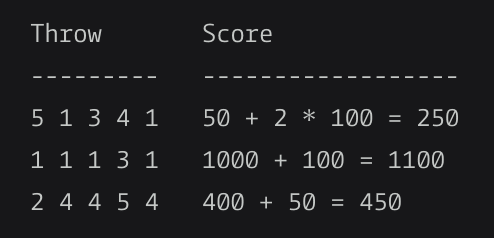Greed is a dice game played with five six-sided dice. Your mission, should you choose to accept it, is to score a throw according to these rules. You will always be given an array with five six-sided dice values.
Three 1's => 1000 points
Three 6's => 600 points
Three 5's => 500 points
Three 4's => 400 points
Three 3's => 300 points
Three 2's => 200 points
One 1 => 100 points
One 5 => 50 point
A single die can only be counted once in each roll. For example, a "5" can only count as part of a triplet (contributing to the 500 points) or as a single 50 points, but not both in the same roll.
Example scoring
In some languages, it is possible to mutate the input to the function. This is something that you should never do. If you mutate the input, you will not be able to pass all the tests.
This challenge comes from JulianNicholls on CodeWars, who has licensed redistribution of this challenge under the 2-Clause BSD License!
Want to propose a challenge idea for a future post? Email yo+challenge@dev.to with your suggestions!



Top comments (7)
Hi, Julian here!
There are two subtleties that catch out a great deal of the people who try this on Codewars.
The first is mentioned in this article, don't mutate the input.
The second is shown up by this combination: 3 3 3 3 2
That should score 300, but many people end up incorrectly giving 0 as the score.
What do you mean with "Don't mutate the input"? The variable that is given isn't changed, right?
In some languages on Codewars (Python is the problem here, I think) it is possible to mutate the array that is passed as input. That will guarantee that the test will fail.
Generally it is not good to mutate the input to a function, unless that is the expected behaviour.
Why do they give 0?!
The problem comes when there aren't exactly three of a number.
I guess that's no more contrived than the solution that would give 600 so that's okay.
Javascript!